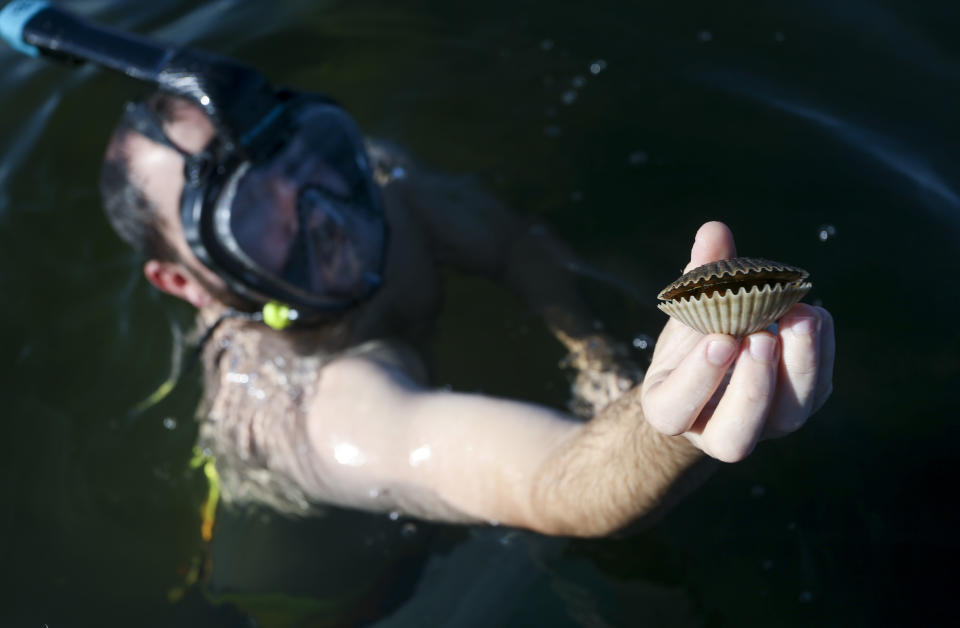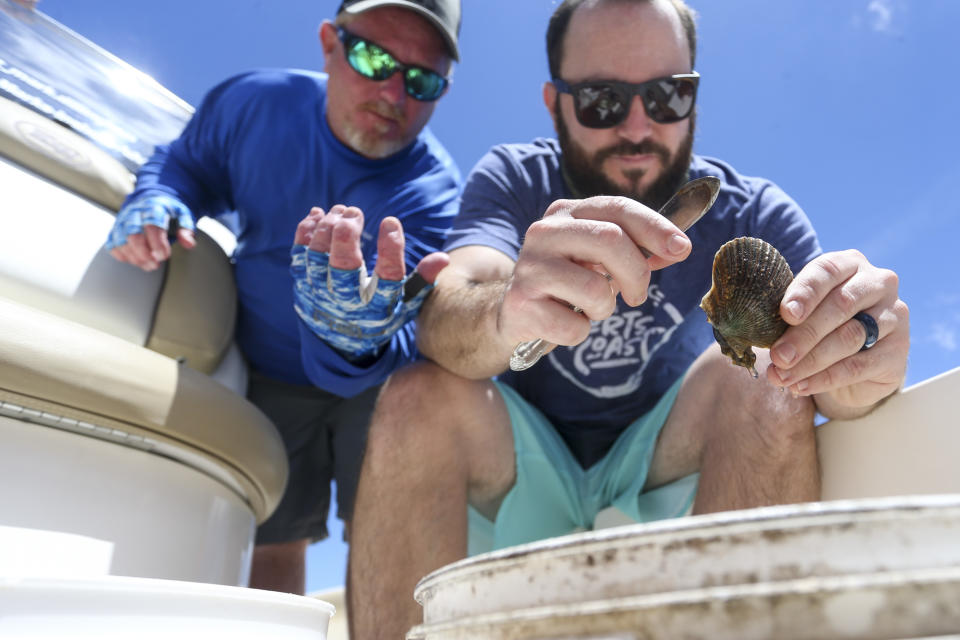Florida pauses popular Pasco scallop season after unsafe toxins found in waters
Florida wildlife officials announced Wednesday they are temporarily closing all state waters along Pasco County south of the Hernando county line to recreational scallop harvesting after water quality tests found unsafe toxins produced by harmful algal blooms.
Officials said they detected potentially harmful levels of an algal bloom called Pyrodinium bahamense and the toxins it creates. The so-called saxitoxin can build up in shellfish and lead to human illness if a contaminated scallop is consumed, according to the Florida Fish and Wildlife Conservation Commission.
The closed waters, which include north of the Anclote Key Lighthouse in northern Pinellas County, won’t reopen until water tests return to safe levels established by the National Shellfish Sanitation Program, according to the wildlife commission.
The unexpected closure is sure to disrupt countless plans for the likely hundreds of boaters and snorkelers who anticipated sleuthing around Pasco’s seagrass beds over the upcoming weekend in search of the prized bay scallop. The county’s tourism arm had planned to host social media influencers on a scallop hunting venture Thursday.
Beyond the thrill of the search, people travel from around the state each year to collect the shellfish for its tender white meat. Boats are limited to 10 gallons of scallops per day when the season is underway.
Pasco County Commissioner Jack Mariano said he was disappointed in the closure because it seemed that the scallops found with the contamination were mostly centered around the Anclote River. A couple of others were found further north and one was found in Hernando County waters.
“I asked them: ‘Why not just close the concentrated area?’” he said. “It’s not fair to us” if the problem in concentrated only in a small spot.
While Mariano said he is concerned about the health risk, he was surprised to see the notice of closure come out without Pasco being notified Wednesday evening.
“I’m not pleased with them,” he said, adding that he expects to be on a call with experts midday. He also said that the agency is considering closing scalloping in Hernando since a sampling there also had been suspect. Wildlife officials were out taking water samples in Hernando and Citrus counties this week, emails show.
Mariano said that he had just talked to Adam Thomas, head of Pasco County Tourism. Thomas was hosting social influencers Thursday who came to see scalloping. But when they went out today, “it was so sad because there is not a single boat on the water.”
Experts regularly pull water samples looking for Pyrodinium from areas like Pasco County where scallops are being harvested. If they find it in the water, scallops will then be tested for the algal bloom toxins.
Scallops can collect the toxins, which are colorless, tasteless and have no smell, according to wildlife experts. Cooking cannot destroy the toxins. If a human were to consume a scallop with high levels of toxin, they could become ill with Paralytic Shellfish Poisoning, which could lead to dizziness, nausea, vomiting, respiratory issues, headaches and other health complications.
People who eat a scallop with high levels of toxins can start having symptoms as soon as 15 minutes after ingestion, but symptoms can also start up to 10 hours later, according to the wildlife commission. Extreme cases of the illness can last for up to 45 days.
Waters are still open for fishing, boating and swimming, wildlife officials said, and all other designated scallop harvest areas in the Gulf remain open.
While it’s sad news that snorkelers won’t be able to search for scallops for now, there is an upside to closing down the harvest, according to Maya Burke, an assistant director of the Tampa Bay Estuary Program.
Tampa Bay relies on the scallops up north by Anclote Key for its own population. Scallops are considered “broadcast spawners,” meaning they release their sperm and eggs into the open water and let the tides and currents do the rest. Genetic analysis has shown the scallops in Tampa Bay are related to those found in and around Anclote Key to the north, Burke said.
“We know it’s a bummer because it’s a really fun thing,” Burke said in an interview. “But there’s a silver lining to this: A shorter scallop season could help repopulate Tampa Bay.”
This year, there was also community support to move the start of the season back from the Fourth of July holiday weekend, when boaters take to the water anyway to kick off the summer. Last year, a serious accident in Homosassa over the holiday sparked discussion about a later scalloping season start for safety reasons.
Pasco County officials, who had been pushing for a longer scallop season, were excited to hear earlier this year that the Florida Fish and Wildlife Conservation Commission was going to offer a 40-day season.
For 25 years, Pasco County was not permitted to have a scallop harvest because the state had determined that the shellfish didn’t populate Pasco waters at a high enough concentration to sustain a harvest at that time.
In 2016, the agency started to review how to manage the scallop crop considering community interest and the stability of the population. As the review continued, the agency detected strong support for seasons tied to regions.
Two years later, a 10-day season was approved for Pasco. In 2022, Mariano pushed the state to extend the short season and succeeded in getting a 31-day season approved.
This 40-day season approved for this summer would have been the longest since the popular activity returned.


